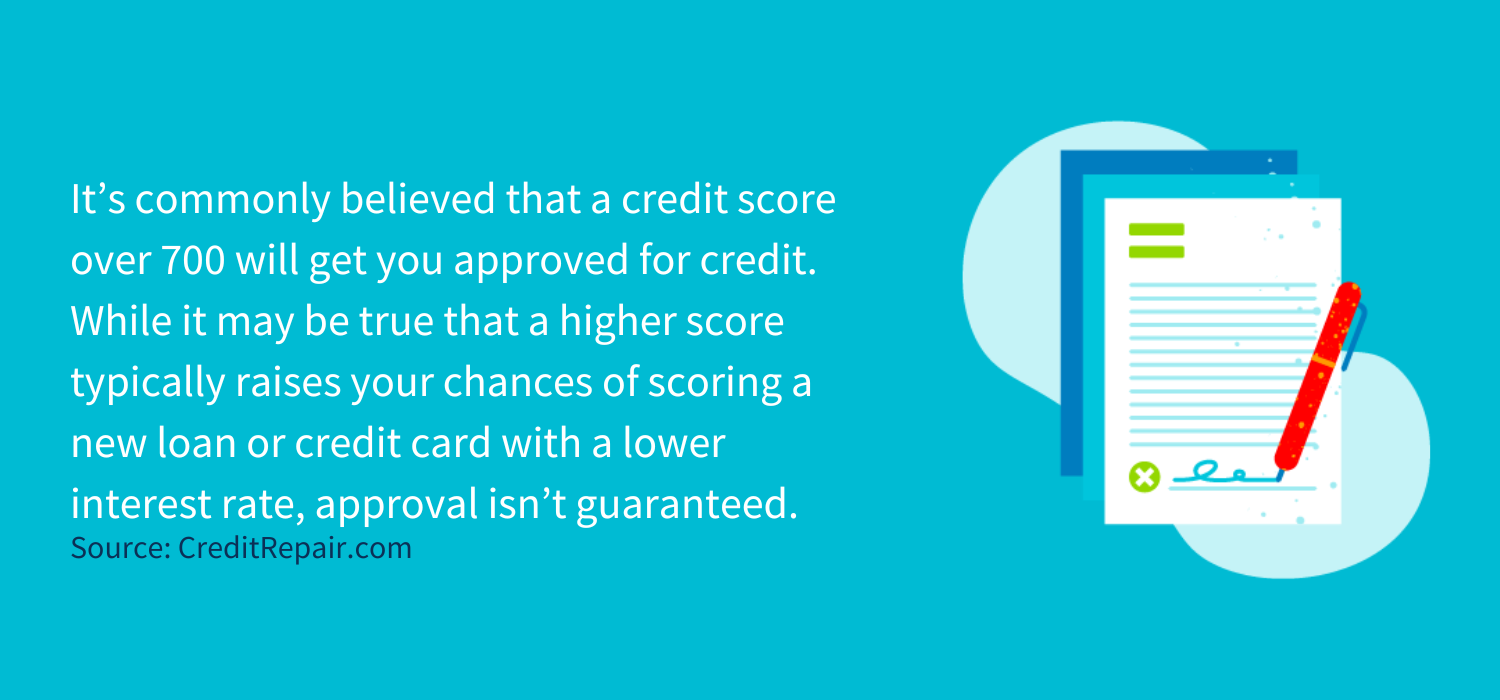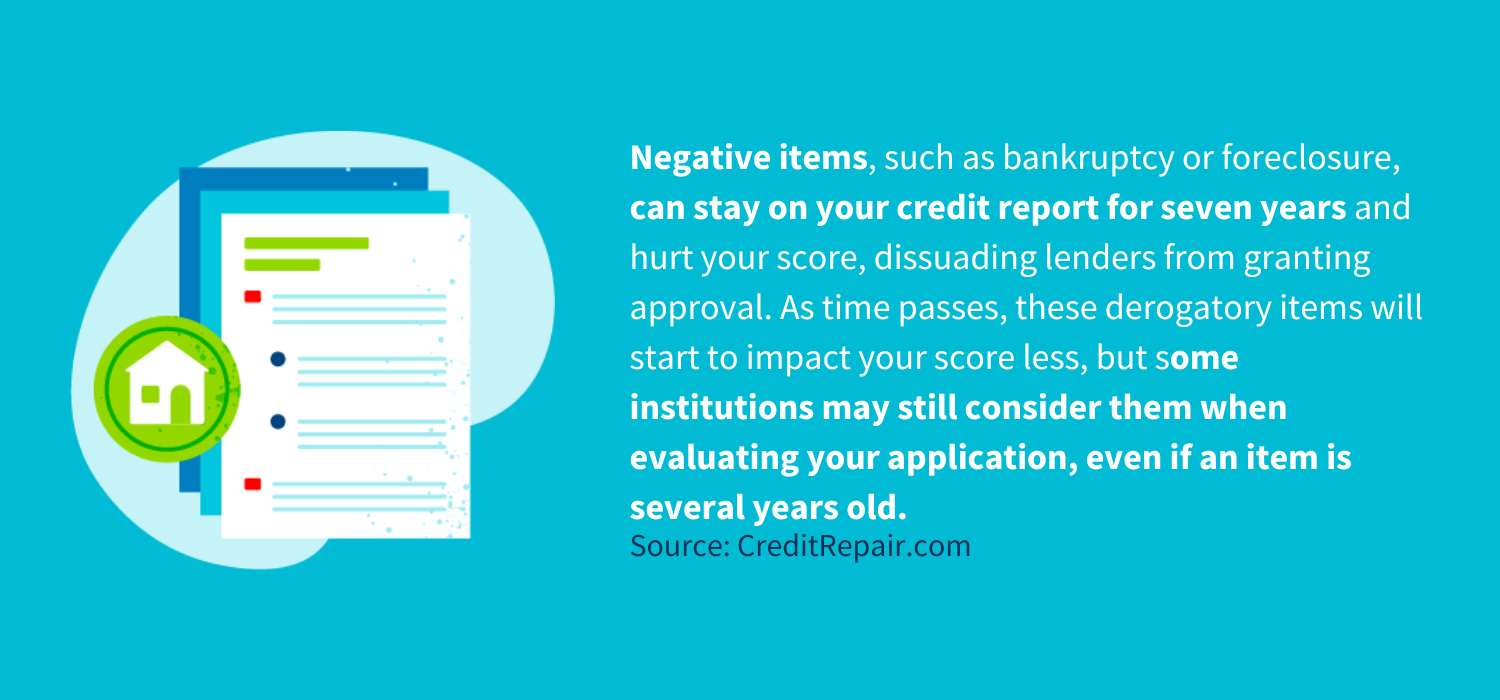
Disclosure regarding our editorial content standards.
According to the FICO® scale, a good credit score falls between 670 and 739. However, having a score in that range or above doesn’t guarantee approval on credit applications. Your credit score isn’t the only factor lenders consider when processing an application, which means even people with an excellent score risk being denied.
Some common reasons someone with a good credit score may be denied are having too much existing debt, not having enough income or having too many recent hard inquiries.
A good credit score doesn’t guarantee your application will be accepted

It’s commonly believed that a credit score over 700 will get you approved for credit. While it may be true that a higher score typically raises your chances of scoring a new loan or credit card with a lower interest rate, approval isn’t guaranteed.
Your history with borrowed money is a lot more complex than your current score, which is why that number isn’t the only aspect issuers look at. They also consider your income level, recent bankruptcies, late or missed payments and your credit utilization ratio at the time you apply. The exact factors used to determine whether you’ll be approved or denied will vary depending on the lender.
8 reasons why your application may have been denied
1. They used a different credit scoring model than you expected
FICO is the credit scoring model most commonly used by lenders when assessing a new application. However, there are multiple versions of the FICO score, including models used specifically for bank cards and vehicles. The data available from each of the three credit bureaus can also impact your score.
It’s also possible the lender is using VantageScore instead of FICO. VantageScore has become increasingly popular and is often used by websites that provide free credit scores. Your score may differ across scoring models, which means there’s a possibility the score you think you have and the score a lender is actually seeing are different.
2. Your debt utilization ratio or debt burden is too high
Your debt utilization ratio is how much you owe on all your credit accounts combined compared to your total available credit. Banks and credit card companies may use this ratio to determine how likely you are to make monthly payments on time. The lower this ratio is, the better your chances of getting approved.
The amount of debt you owe compared to your annual income is another factor lenders consider. Banks will look at the total monthly payment on your credit report, which includes all open accounts, such as credit cards, mortgage loans and auto loans, and divide that total monthly payment by your gross salary. If your debt-to-income (DTI) is above 50 percent, there’s a good chance you may be rejected.
3. Your employment and income may not seem dependable
Income level doesn’t directly affect your credit score, but a dependable income is a critical part of a lender’s evaluation when deciding how likely it is you’ll be able to make the monthly payments. Irregular or below-average income may cause an issuer to hold back from approving you out of fear you won’t pay back your debt. For instance, if your annual income is around $20,000, your chances of being approved for a $10,000 credit limit are slim.
4. You have many recent hard inquiries listed on your credit report
A hard inquiry typically occurs when you apply for new credit, such as a credit card, student loan, auto loan, mortgage loan or personal loan. The lender will conduct a hard pull of your credit report and history to check for negative remarks, including late payments. While credit inquiries only make up 10 percent of your total FICO credit score and five percent of your VantageScore, several hard inquiries in a short period can lower your score enough to do some damage.
Several recent hard inquiries can make you seem credit hungry, meaning you’ve been applying for multiple credit opportunities you see. This signifies to lenders your financial life may be unstable, and there’s a good chance you won’t be able to pay back what you borrow.
5. Your credit history is short
Length of credit history plays a major role in determining your risk as a borrower. Lenders want to see a consistent pattern of good credit practices. If your history is short, it may not matter how high your credit score is. As frustrating as this is, the only real solution is to wait. A good credit history length is usually at least seven years, but this threshold may vary depending on the lender. In the meantime, continuing to make on-time payments will maintain your good score.
6. The card wasn’t marketed to you or there may be other issuer restrictions
Some issuers place restrictions on who gets approved for certain cards or offers that have nothing to do with the applicant’s credit score. Understanding what credit card companies are looking for can make sure you’re the ideal candidate they’re marketing to and increase your chances of being approved.
Issuers may also limit how many cards an applicant can open with them. For instance, Chase offers several types of Sapphire travel credit cards. However, you can only have one. If you apply for a second one as a new customer, you won’t be approved.
7. Derogatory items may not have fallen off your report just yet

Negative items, such as bankruptcy or foreclosure, can stay on your credit report for seven years and hurt your score, dissuading lenders from granting approval. As time passes, these derogatory items will start to impact your score less, but some institutions may still consider them when evaluating your application, even if an item is several years old. However, the older the items are, the less they’ll affect you. Waiting it out may be the best way to increase your chances of approval.
8. Your credit may not be high enough
It’s also possible your score just isn’t high enough to get approval for the specific card or loan you’re applying for. Credit score scales usually range from 300 to 850. A score of 690 does technically fall into the good credit category but is on the low end. This may hurt your chances of approval for credit cards with the biggest rewards, such as sign-on bonuses or lucrative cash-back offers. Taking the time to raise your score even higher may be the most beneficial thing you can do to improve your odds.
How to get the loan of your dreams
If you’re planning to apply for a new credit card, mortgage or car loan but fear your good credit score may not be enough, assessing your financial situation to pinpoint areas of improvement can bring you one step closer to an approval. Here are a few places to start:
- Catch up any past-due accounts.
- Pay down high balances.
- Apply for new credit sparingly
- Limit usage with existing credit cards to keep your debt burden low.
- Consider repairing your credit
Getting denied for a loan you really want can be frustrating, especially if you have what’s considered a good credit score. At CreditRepair.com, we’ll work with you by reviewing any factors that may be affecting your chances of scoring your dream loan and helping you better manage your credit. Contact us today for a free online credit evaluation and brighten your financial future.
Note: The information provided on CreditRepair.com does not, and is not intended to, act as legal, financial or credit advice; instead, it is for general informational purposes only.
Questions about credit repair?
Chat with an expert: 1-800-255-0263






